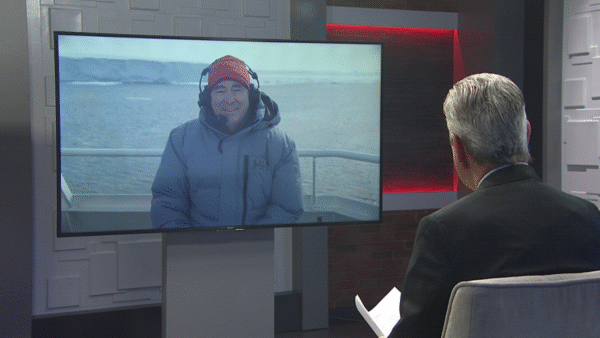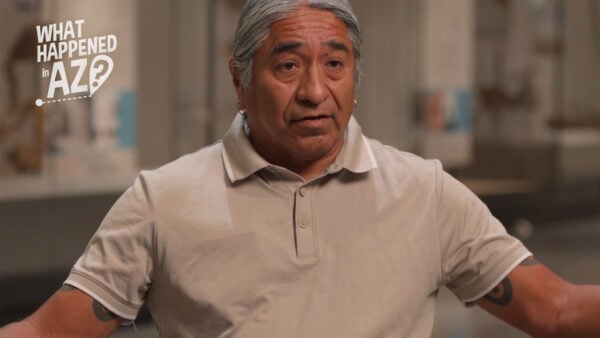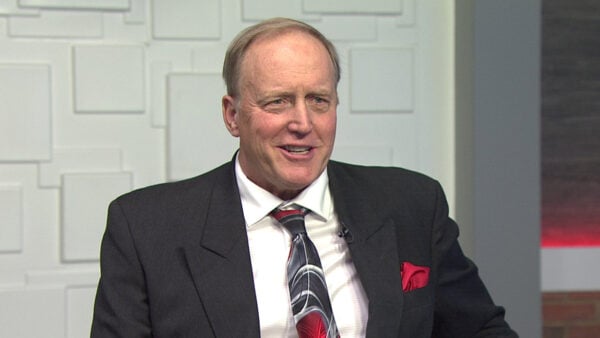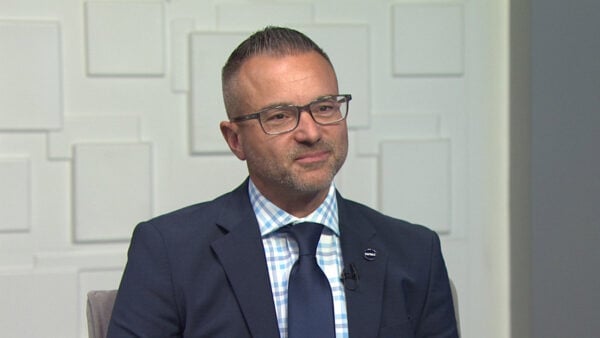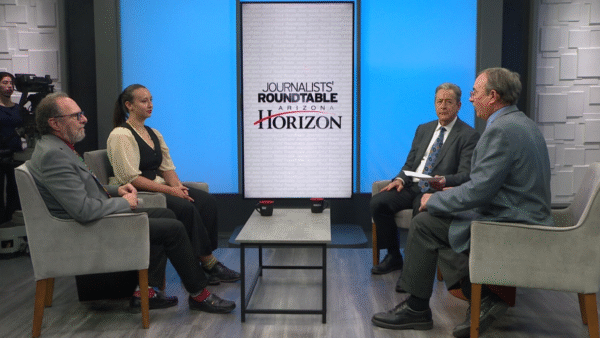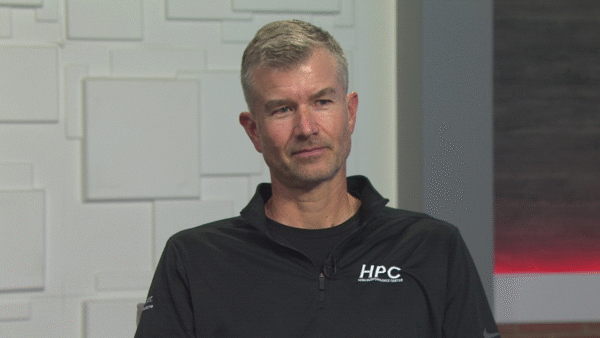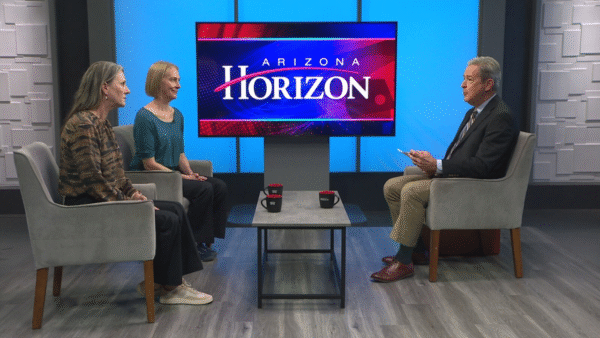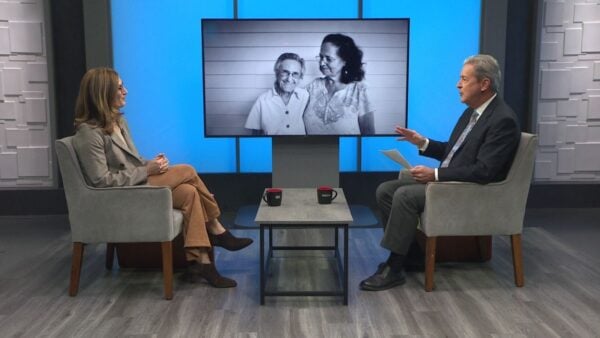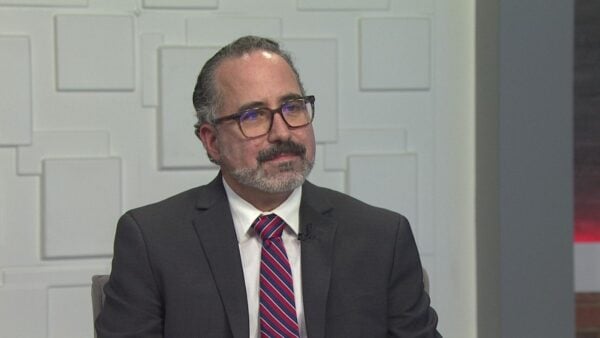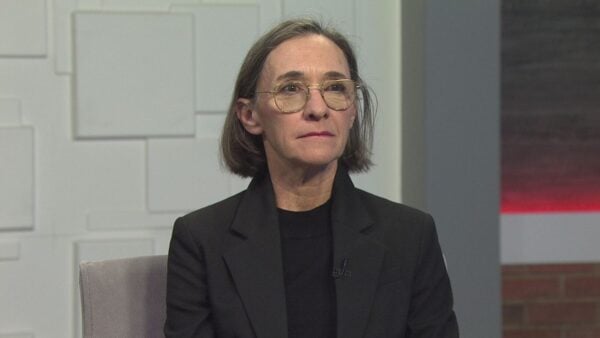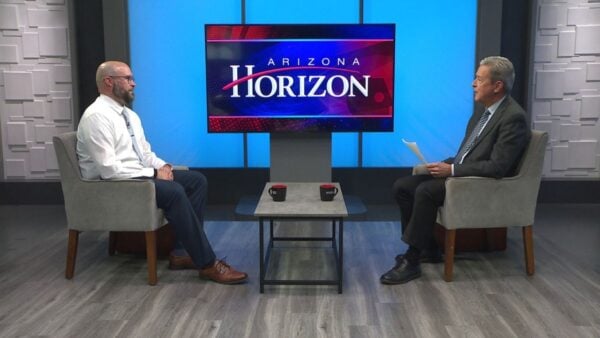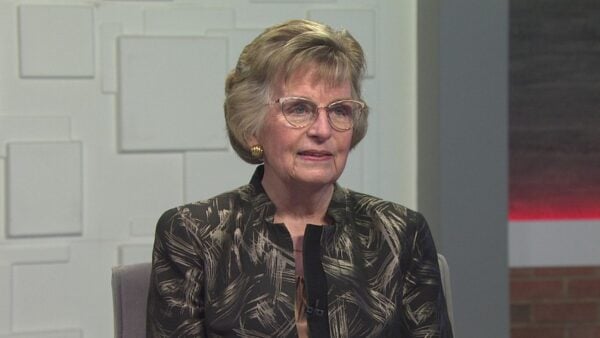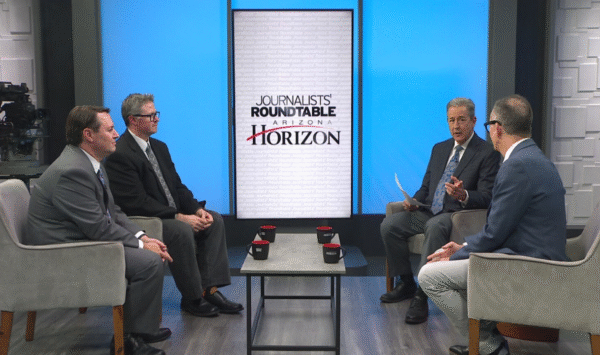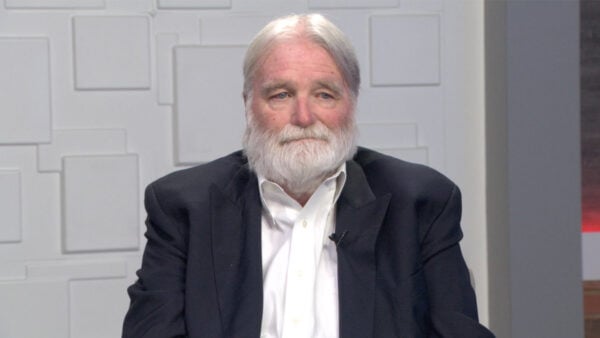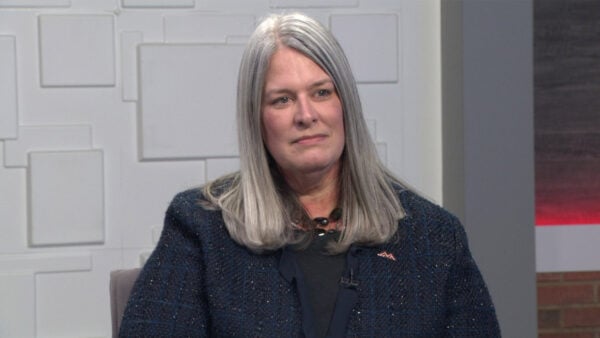Arizona Chamber of Commerce and Industry President
and CEO Glenn Hamer, National Federation of Independent Business State Director Farrell Quinlan and Greater Phoenix Chamber of Commerce President and CEO Todd Sanders discuss their organizational legislative priorities for 2012.
Ted Simons: Good evening, and welcome to "Arizona Horizon." I'm Ted Simons. Phoenix has a new Mayor, Greg Stanton, took the oath of office this morning. Stanton was sworn in by former Arizona Governor Rose Mofford at a ceremony inside the historic Orpheum Theater. During his inaugural address, Stanton announced a new partnership between ASU, the Mayo clinic and the private sector to develop a bioscience center around the Mayo clinic's 210-acre campus in north Phoenix. Democratic state Senator Kyrsten Sinema announced her candidacy for Arizona's new congressional district 9. Kyrsten Sinema was first elected to the state house of Republicans in 2004. She declared her candidacy today in an online video.
Ted Simons: And a state Senate ethics investigation of Senator Scott Bundgaard will move forward. A Maricopa County superior court judge today dismissed a lawsuit filed by Bundgaard's attorney, that looked to stop a committee hearing scheduled for this Thursday. Judge John Buttrick dismissed the suit saying the court has no authority in what is a purely political matter. The ethics hearing focuses on an alleged domestic dispute between Bundgaard and a former girlfriend, the Peoria republic doesn't believe he'll get a fair trial, which could recommend Bundgaard be removed from office.
Ted Simons: And business leaders will host the Governor and top lawmakers this Friday at the 2012 legislative forecast luncheon. The event allows the business community to express a wish list of sorts for the upcoming legislative session, and here to talk about those priorities are Glenn Hamer, President and CEO of the Arizona chamber of commerce and industry. And Todd Sanders, President and CEO of the Phoenix chamber of commerce, and Farrell Quinlan, with the national federation of independent business. Good to have you here and thanks for joining us tonight on "Arizona Horizon."
Glenn Hamer: Great to be here.
Todd Sanders: Thanks for having us.
Ted Simons: Before we start with what you want from the next legislative session, what did you get from the last one that you are happy with?
Glenn Hamer: Ted, I appreciate how you phrased that. We had a phenomenal session last year. And we give the Governor and the state legislature all the credit in the world for passing a once in a generation competitiveness package. At its core, it reduces our corporate income tax rates, as well as our business property tax rates, and it also creates a transformational entity in the Arizona commerce authority, and we, we saw today, with Don and Jerry Colangelo and the Governor what that legislation really means, and what that meant today was can the Valley Bank announce it will bring several hundred well paying jobs to the State of Arizona. I don't believe that would have been possible without the Patterson of the competitiveness package.
Ted Simons: Something like that not possible without things like corporate tax cuts and property tax reductions and the commerce authority?
Todd Sanders: I think that's a huge, a huge component to it. And I think for a long time, the economic development strategy kind of revolved around golf courses and sunshine, and this really puts us on the map. I think things started when we looked at Senate bill 1403, which was the manufacturing incentives bill, and we're starting to grow on that, and there is room there, so I would agree with that.
Ted Simons: Some critics out there are saying there is too much emphasis on big business, on the big stuff, as opposed to the little guy. What did he say about that?
Farrell Quinlan: Well, you know, a lot of, like 1,300 bills are introduced every year, and 350 ever get passed, and you probably talk about a dozen or two on this program, so there is a lot that goes on at the legislature that's very important. And a lot of that having to do with regulatory reforms, very, very pro regulatory reform, legislature and Governor, and we have seen a number of areas where, where the, the majority that were elected in November of, of 2010, you know, really, really, you know, grabbed onto really big issues, and hopefully, this, this coming session, they will actually see fruition of some of their, their wants, when it comes to taxation regulation and litigation, that the three things, the three inputs from Government, that usually hamper business development and growth.
Ted Simons: Let's go to taxation first. Capital gains tax relief, that's what you are looking for?
Farrell Quinlan: Actually, small businesses are really looking for, for some sort of relief when it comes to equipment and manufacturing things, and such as, you know, the equipment that we used to create jobs, and, and there is a proposal to, to increase the exemption on that, and we're looking for, for some relief whether it comes to, to, to regulation at the local level, and applying some of the same protections and standards that the state and Federal Government provide businesses at the, at the county and local level, and when it comes to litigation, there are things that we can do, to, to curb the lawsuit abuse, and all those things are going to hopefully make some gains this year.
Ted Simons: I want to get to the tort reform in a second. As far as taxation relief and regulation relief, someone out there is saying, they think that's all we hear, how much more do you need?
Todd Sanders: What we need is a strategic approach, and as I said, I think that's what we are starting to see is a real, a real thoughtful approach to how we're going to go about doing this. The fact that Glenn mentioned today that we have a new business coming here with 500 high paying jobs is proof of that. So, it's not how much, it's really how are you doing it in the right way that's going to bringing the biggest bang for the buck?
Ted Simons: How do you make sure that happens?
Glenn Hamer: I want to just point out, this never ends, I mean, it's not like we're doing this in isolation. There are 49 other states, and we believe that we're doing more than any other state, and just getting back to the competitiveness package, I believe that Arizona was number one in the nation last year, and in terms of improving its position, and we want to do more, and you mentioned capital gains, Farrell mentioned something on business property, which is important, and there is more work that can be done. I also believe that we're, we're going to be in a, in a period where it's going to be important to support the Arizona commerce authority, to make sure that this new entity is, is, is properly, is working with the business community, which I am sure it will be, to use all these wonderful new tools that, that the state passed last year.
Ted Simons: I don't want to spend too much time on the commerce authority, but why is that, that necessary. When you have the groups out there, that are trying to woo business here, why is this necessary?
Glenn Hamer: I just want to first say that the trios, these are world class organizations, but it's a great question. Why is it necessary? In September, we, we participated in a trip to China with the Arizona technology council, with the, the Arizona commerce authority, and with Governor brewer, and what was fascinating to me is that for the Chinese business leaders, and Chinese governmental officials, it was extremely important to have a, a critical statewide entity with a backing of the Governor, and you could see in the statistics, my understanding is that the business leads are way up since the establishment of the Arizona commerce authority, and the commerce authority is working very well with the, the regional economic development entities, and again, getting back to the today's announcement, G-pec was there, but we need a center of gravity, and the Arizona commerce authority is that center.
Todd Sanders: Is something led by the chief executive office of the state? It's important for, for folks in other countries to see this is a statewide approach, and the work that he has done has been tremendous. There is no question that it just -- it compliments what's going to happen.
Ted Simons: What kind of jobs, we keep hearing Arizona generating jobs, and yet, we look at some of these jobs, are these the kinds of jobs that we want or is any job right now a good job?
Todd Sanders: I mean, it depends on who you talk to, there are a lot of people look at this and say, this, but when you look at this from a broad perspective, were you node to look at this but when you are incentivizing, we need to look at high school jobs.
Ted Simons: I want to get back to tort reform. What needs to be done as far as punitive damages here?
Farrell Quinlan: Ultimately, there is a constitutional issue when it comes to limiting someone's right to sue, and that's not something that I understand is going to, to -- is on the agendas, but there are some things that you can do to make sure that, that certain procedures are in place, and that don't allow frivolous lawsuits to go forward, and keep, keeps the business community in a position where they can understand what their liability is going to go forward, and their insurance costs won't go way up, and as expanded rights to, to sue. And to go back a bit to, to the whole jobs question is, and Todd is right, we lost 300,000 plus jobs in this recession, and so, as much as is great to see a few hundred jobs come with this announcement, it's going to take thousands of years to get back to where we need to be if that's what we do every day, is 8 announce a couple hundred jobs here and there, and we need to get, you know, huge chunks of jobs coming back here, and a lot of that comes down to some of these things we're talking about that aren't as sexy, don't get the headlines, but it's having a regulatory environment, and a tax environment, a litigation environment that, that, that says it's safe to invest money in Arizona, safe to hire workers here, and because you can make your way in the state.
Ted Simons: And I know that, that a lot of business concerns right now, are, are obviously, the sorts of things we're talking about, but other businesses tell me, at least, what they are looking for is customers. They need people with money in their pockets to go buy their stuff. And they can hire more folks, and we get more jobs. And is that on a separate plane, a separate track than the other things we're talking about, incentive packages?
Todd Sanders: It is a, a chicken and the egg kind of thing with the consumers, and businesses, and when, when businesses start hiring again, and people start to feel more comfortable, that they can spend money, that starts to, that starts to spin the wheel, so the velocity of money increase, and all of a sudden you have people coming in the door. But you are right, when we talk to members of the Phoenix chamber of commerce, one of the biggest issues is we need people walking in the door, and so, you have got to figure out a way to start that wheel spinning.
Ted Simons: But Glenn, with budget cuts and health care budget cuts and there is an idea out there with the tax, or lack of a better phrase, but with so many service cuts out there, folks that were getting assistance, not necessarily getting that right now, how are they getting the money to come through and buy what you are selling?
Glenn Hamer: We do need to make sure access is, funded at a higher level. I have no doubt about that, Ted. But, in terms of getting more, more dollars into the consumer's pockets, it's -- that's part of it. Consumer confidence is part of it, and when I have had discussions with Todd, over the many months, you contrast what we're doing on the state level, which directionally is about all in the right direction, and contrast that with, with what's been happening on the Federal level, and, you know, things have not exactly been moving in a, a coherent fashion, in Washington, and, and part of this is as we increase consumer confidence we'll see people, people, people loosening the, their wallets.
Todd Sanders: And to that point, we had a poll that recently went out, and exactly what Glenn is saying, and looking at Arizona and the outlook, people are pretty bullish on Arizona, but looking at the Federal level, especially with what's happening with Congress, that's where people are reticent.
Ted Simons: How are you seeing that balance between consumer confidence and consumer ability just to go out and buy something?
Farrell Quinlan: I think that you are seeing some of that with the foreclosures, where there was the original foreclosure way, that people just in houses they could not afford but people are being foreclosed on, because they have burned through the savings, and lost their jobs, and it's for economic reasons. And I think what we need is as a nation, we need to get some of these, some uncertainty about, about the health care bill that will be, in some way, settled in June, when the supreme court rules it will, a little shameless plug, and the litigant on the individual mandates, and so, we're, we're keeping a close eye on that, but also, the labor, a situation with some of the rules coming down from the national labor relations board, and what Congress is unable to do, because of the, of the gridlock in D.C., we're hoping that the elections that, that occur in about 11 months, will, will give some sort of certainty going forward, so people can start making investments and have a better idea of what they are getting into when they put their money on the line.
Ted Simons: I keep hearing uncertainty. We have economists that talk about uncertainty, and they talk about that, that quite a bit. And yet, you also go past the other direction where you are saying, who cares about uncertainty. Folks have money, they are going to buy what you are selling. What do you make of that?
Todd Sanders: I think that uncertainty plays a huge role, and a lot of it is from what's happening, at the Federal level, state level, 11 people need to make sure, and they are right, that, that the policies are going to be in place on the regulatory reform, for them to be able to hire people, and there is not a bunch of red tape that's going to cost more and be more burdensome, so there is something to that.
Ted Simons: And how much can, last question, we're talking about what you are looking for, and how much can the legislature really, really help business. Sometimes, someone famous said, the Government doesn't knock on the door and say, I'm here to help you are that's a good thing. What do you want to see?
Glenn Hamer: The legislature and the Governor can and have been doing everything, just about everything possible to make the environment as conducive as possible for job creation. And we want to see that, that, that focus continue, and into 2012.
Ted Simons: What do you want to see?
Todd Sanders: Some leadership on the health care exchange. Obviously, with the national health care act that, that certainly, we opposed, and there is a mandate to create a state exchange or take a Federal one size fits all, we need a state exchange, that's one of the things that we want to see.
Ted Simons: Ok, what do you want?
Farrell Quinlan: Hold the line on spending, the tax, one cent sales tax goes away in a year. It was supposed to be temporary, and it should be temporary, and it should be retired. As it was promised.
Ted Simons: Gentlemen, it's good to have you here, and thanks for joining us. We appreciate it.
Guests: Thank you.
Glenn Hamer:President and CEO, Arizona Chamber of Commerce and Industry; Farrell Quinlan:State Director, National Federation of Independent Business; Todd Sanders:President and CEO, Greater Phoenix Chamber of Commerce;
